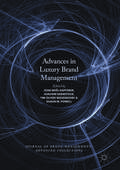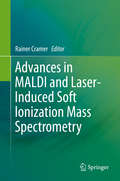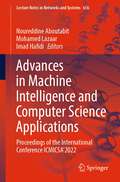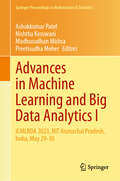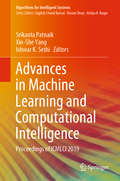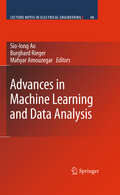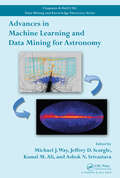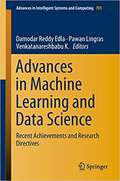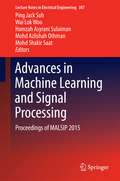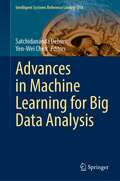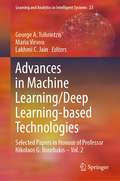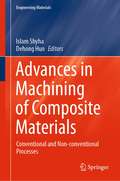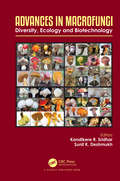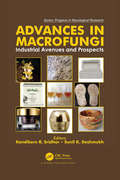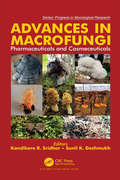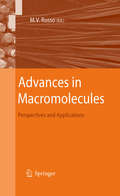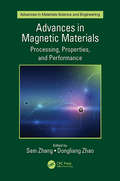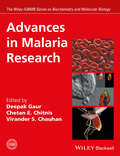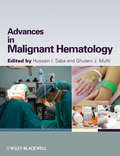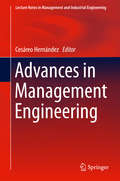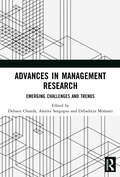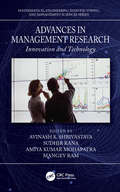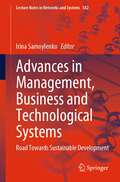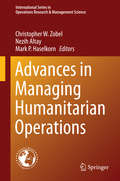- Table View
- List View
Advances in Luxury Brand Management (Journal of Brand Management: Advanced Collections)
by Jean-Noël Kapferer Joachim Kernstock Shaun M. Powell Tim Oliver BrexendorfPresenting some of the most significant research on the modern understanding of luxury, this edited collection of articles from the Journal of Brand Management explores the complex relationships consumers tie with luxury, and the unique characteristics of luxury brand management. Covering the segmentation of luxury consumers worldwide, the specificity of luxury management, the role of sustainability for luxury brands and major insights from a customer point of view, Advances in Luxury Brand Management is essential reading for upper level students as well as scholars and discerning practitioners.
Advances in MALDI and Laser-Induced Soft Ionization Mass Spectrometry
by Rainer CramerThis book covers the state-of-the-art of modern MALDI (matrix-assisted laser desorption/ionization) and its applications. New applications and improvements in the MALDI field such as biotyping, clinical diagnosis, forensic imaging, and ESI-like ion production are covered in detail. Additional topics include MS imaging, biotyping/speciation and large-scale, high-speed MS sample profiling, new methods based on MALDI or MALDI-like sample preparations, and the advantages of ESI to MALDI MS analysis. This is an ideal book for graduate students and researchers in the field of bioanalytical sciences. This book also: * Showcases new techniques and applications in MALDI MS * Demonstrates how MALDI is preferable to ESI (electrospray ionization) * Illustrates the pros and cons associated with biomarker discovery studies in clinical proteomics and the various application areas, such as cancer proteomics
Advances in Machine Intelligence and Computer Science Applications: Proceedings of the International Conference ICMICSA’2022 (Lecture Notes in Networks and Systems #656)
by Mohamed Lazaar Noureddine Aboutabit Imad HafidiThis book encloses latest and advanced researches on artificial intelligence and its applications in computer science. It is an interesting book that aims to help students, researchers, industrialists, and policymakers understand, promote, and synthesize innovative solutions and think of new ideas with the application of artificial intelligence concepts. It also allows to know the existing scientific works and contributions in the literature. This book identifies original research in new directions and advances focused on multidisciplinary areas and closely related to the use of artificial intelligence in applications of computer science, communication, and technology. The present book contains selected and extended high-quality papers of the 1st international conference on Machine Intelligence and Computer Science Applications (ICMICSA’2022). It is the result of a reviewed, evaluated, and presented work in ICMICSA’2022 held on November 28–29, 2022, in Khouribga, Morocco.
Advances in Machine Learning and Big Data Analytics I: ICMLBDA 2023, NIT Arunachal Pradesh, India, May 29-30 (Springer Proceedings in Mathematics & Statistics #441)
by Preetisudha Meher Nishtha Kesswani Madhusudhan Mishra Ashokkumar PatelThis edited volume on machine learning and big data analytics (Proceedings of ICMLBDA 2023, that was held on May 29-30, 2023 by NERIST and NIT Arunachal Pradesh India) is intended to be used as a reference book for researchers and professionals to share their research and reports of new technologies and applications in Machine Learning and Big Data Analytics like biometric Recognition Systems, medical diagnosis, industries, telecommunications, AI Petri Nets Model-Based Diagnosis, gaming, stock trading, Intelligent Aerospace Systems, robot control, law, remote sensing and scientific discovery agents and multiagent systems; and natural language and Web intelligence. The intent of this book is to provide awareness of algorithms used for machine learning and big data in the advanced Scientific Technologies, provide a correlation of multidisciplinary areas and become a point of great interest for Data Scientists, systems architects, developers, new researchers and graduate level students. This volume provides cutting-edge research from around the globe on this field. Current status, trends, future directions, opportunities, etc. are discussed, making it friendly for beginners and young researchers.
Advances in Machine Learning and Computational Intelligence: Proceedings of ICMLCI 2019 (Algorithms for Intelligent Systems)
by Xin-She Yang Ishwar K. Sethi Srikanta PatnaikThis book gathers selected high-quality papers presented at the International Conference on Machine Learning and Computational Intelligence (ICMLCI-2019), jointly organized by Kunming University of Science and Technology and the Interscience Research Network, Bhubaneswar, India, from April 6 to 7, 2019. Addressing virtually all aspects of intelligent systems, soft computing and machine learning, the topics covered include: prediction; data mining; information retrieval; game playing; robotics; learning methods; pattern visualization; automated knowledge acquisition; fuzzy, stochastic and probabilistic computing; neural computing; big data; social networks and applications of soft computing in various areas.
Advances in Machine Learning and Data Analysis (Lecture Notes in Electrical Engineering #48)
by Sio-Iong Ao Burghard B. Rieger Mahyar AmouzegarA large international conference on Advances in Machine Learning and Data Analysis was held in UC Berkeley, California, USA, October 22-24, 2008, under the auspices of the World Congress on Engineering and Computer Science (WCECS 2008). This volume contains sixteen revised and extended research articles written by prominent researchers participating in the conference. Topics covered include Expert system, Intelligent decision making, Knowledge-based systems, Knowledge extraction, Data analysis tools, Computational biology, Optimization algorithms, Experiment designs, Complex system identification, Computational modeling, and industrial applications. Advances in Machine Learning and Data Analysis offers the state of the art of tremendous advances in machine learning and data analysis and also serves as an excellent reference text for researchers and graduate students, working on machine learning and data analysis.
Advances in Machine Learning and Data Mining for Astronomy (Chapman & Hall/CRC Data Mining and Knowledge Discovery Series)
by Ashok N. Srivastava Michael J. Way Jeffrey D. Scargle Kamal M. AliAdvances in Machine Learning and Data Mining for Astronomy documents numerous successful collaborations among computer scientists, statisticians, and astronomers who illustrate the application of state-of-the-art machine learning and data mining techniques in astronomy. Due to the massive amount and complexity of data in most scientific disciplines
Advances in Machine Learning and Data Science: Recent Achievements And Research Directives (Advances In Intelligent Systems And Computing #705)
by Pawan Lingras Damodar Reddy Venkatanareshbabu KuppiliPresents studies involving innovative combination of machine learning and data science.<P><P> Presents latest ideas and techniques in the field of data mining.<P> Serves as a good reference material for future work.<P> The Volume of “Advances in Machine Learning and Data Science - Recent Achievements and Research Directives” constitutes the proceedings of First International Conference on Latest Advances in Machine Learning and Data Science (LAMDA 2017). The 37 regular papers presented in this volume were carefully reviewed and selected from 123 submissions.<P> These days we find many computer programs that exhibit various useful learning methods and commercial applications. Goal of machine learning is to develop computer programs that can learn from experience. Machine learning involves knowledge from various disciplines like, statistics, information theory, artificial intelligence, computational complexity, cognitive science and biology. For problems like handwriting recognition, algorithms that are based on machine learning out perform all other approaches. Both machine learning and data science are interrelated. Data science is an umbrella term to be used for techniques that clean data and extract useful information from data. In field of data science, machine learning algorithms are used frequently to identify valuable knowledge from commercial databases containing records of different industries, financial transactions, medical records, etc.<P> The main objective of this book is to provide an overview on latest advancements in the field of machine learning and data science, with solutions to problems in field of image, video, data and graph processing, pattern recognition, data structuring, data clustering, pattern mining, association rule based approaches, feature extraction techniques, neural networks, bio inspired learning and various machine learning algorithms.
Advances in Machine Learning and Signal Processing: Proceedings of MALSIP 2015 (Lecture Notes in Electrical Engineering #387)
by Ping Jack Soh Wai Lok Woo Hamzah Asyrani Sulaiman Mohd Azlishah Othman Mohd Shakir SaatThisbook presents important research findings and recent innovations in the fieldof machine learning and signal processing. A wide range of topics relating to machinelearning and signal processing techniques and their applications are addressed inorder to provide both researchers and practitioners with a valuable resourcedocumenting the latest advances and trends. The book comprises a carefulselection of the papers submitted to the 2015 International Conference on MachineLearning and Signal Processing (MALSIP 2015), which was held on 15-17 December2015 in Ho Chi Minh City, Vietnam with the aim of offering researchers,academicians, and practitioners an ideal opportunity to disseminate theirfindings and achievements. All of the included contributions were chosen byexpert peer reviewers from across the world on the basis of their interest tothe community. In addition to presenting the latest in design, development, andresearch, the book provides access to numerous new algorithms for machinelearning and signal processing for engineering problems.
Advances in Machine Learning for Big Data Analysis (Intelligent Systems Reference Library #218)
by Satchidananda Dehuri Yen-Wei ChenThis book focuses on research aspects of ensemble approaches of machine learning techniques that can be applied to address the big data problems. In this book, various advancements of machine learning algorithms to extract data-driven decisions from big data in diverse domains such as the banking sector, healthcare, social media, and video surveillance are presented in several chapters. Each of them has separate functionalities, which can be leveraged to solve a specific set of big data applications. This book is a potential resource for various advances in the field of machine learning and data science to solve big data problems with many objectives. It has been observed from the literature that several works have been focused on the advancement of machine learning in various fields like biomedical, stock prediction, sentiment analysis, etc. However, limited discussions have been carried out on application of advanced machine learning techniques in solving big data problems.
Advances in Machine Learning/Deep Learning-based Technologies: Selected Papers in Honour of Professor Nikolaos G. Bourbakis – Vol. 2 (Learning and Analytics in Intelligent Systems #23)
by Lakhmi C. Jain Maria Virvou George A. TsihrintzisAs the 4th Industrial Revolution is restructuring human societal organization into, so-called, “Society 5.0”, the field of Machine Learning (and its sub-field of Deep Learning) and related technologies is growing continuously and rapidly, developing in both itself and towards applications in many other disciplines. Researchers worldwide aim at incorporating cognitive abilities into machines, such as learning and problem solving. When machines and software systems have been enhanced with Machine Learning/Deep Learning components, they become better and more efficient at performing specific tasks. Consequently, Machine Learning/Deep Learning stands out as a research discipline due to its worldwide pace of growth in both theoretical advances and areas of application, while achieving very high rates of success and promising major impact in science, technology and society. The book at hand aims at exposing its readers to some of the most significant Advances in Machine Learning/Deep Learning-based Technologies. The book consists of an editorial note and an additional ten (10) chapters, all invited from authors who work on the corresponding chapter theme and are recognized for their significant research contributions. In more detail, the chapters in the book are organized into five parts, namely (i) Machine Learning/Deep Learning in Socializing and Entertainment, (ii) Machine Learning/Deep Learning in Education, (iii) Machine Learning/Deep Learning in Security, (iv) Machine Learning/Deep Learning in Time Series Forecasting, and (v) Machine Learning in Video Coding and Information Extraction. This research book is directed towards professors, researchers, scientists, engineers and students in Machine Learning/Deep Learning-related disciplines. It is also directed towards readers who come from other disciplines and are interested in becoming versed in some of the most recent Machine Learning/Deep Learning-based technologies. An extensive list of bibliographic references at the end of each chapter guides the readers to probe further into the application areas of interest to them.
Advances in Machining of Composite Materials: Conventional and Non-conventional Processes (Engineering Materials)
by Dehong Huo Islam ShyhaThis book covers a wide range of conventional and non-conventional machining processes of various composite materials, including polymer and metallic-based composites, nanostructured composites and green/natural composites. It presents state-of-the-art academic work and industrial developments in material fabrication, machining, modelling and applications, together with current practices and requirements for producing high-quality composite components. There are also dedicated chapters on physical properties and fabrication techniques of different composite material groups. The book also has chapters on health and safety considerations when machining composite materials and recycling composite materials. The contributors present machining composite materials in terms of operating conditions; cutting tools; appropriate machines; and typical damage patterns following machining operations. This book serves as a useful reference for manufacturing engineers, production supervisors, tooling engineers, planning and application engineers, and machine tool designers. It can also benefit final-year undergraduate and postgraduate students, as it provides comprehensive information on the machining of composite materials to produce high-quality final components. The book chapters were authored by experienced academics and researchers from four continents and nine countries including Canada, China, Egypt, India, Malaysia, Portugal, Singapore, United Kingdom and the USA.
Advances in Macrofungi: Diversity, Ecology and Biotechnology
by Kandikere Ramaiah Sridhar Sunil Kumar DeshmukhAdvances in Macrofungi: Diversity, Ecology and Biotechnology discusses the diversity and ecology of edible, toxic, medicinal and mycorrhizal macrofungi; the impact of ectomycorrhizal fungi in terrestrial ecosystems, ectomycorrhizal complex in Boreal forests and commercial application of Pseudotsuga in silviculture; the nutritional evaluation and cultivation of edible wild mushrooms; the diversity of novel metabolites of macrofungi useful in food, pharmaceutical and cosmeceutical industries; mushrooms as tool for eco-friendly synthesis of nanoparticles and proteomics of edible and medicinal mushrooms. In addition, it covers experimental designs, methodological approaches, biogeochemical cycles, conceptual/hypothetical models and life history strategies, linking mycorrhizal diversity to plant performance, chemotaxonomy, role of mycorrhizae in forestry and macrofungi in nanotechnology. It provides a valuable resource to graduate, post-graduate and researchers (in botany, microbiology, ecology, biotechnology, forestry, life sciences and environmental sciences) to understand the diversity, ecology, therapeutic value, mutualistic associations and biotechnological potential of macrofungi.
Advances in Macrofungi: Industrial Avenues and Prospects (Progress in Mycological Research)
by Kandikere R. SridharLarge scale cultivation of macrofungi is possible with fermentation, using easily accessible lignocellulosic agricultural residues applying economical methods to generate substantial biomass, food and biofuels. Bioconversion of lignocellulosic wastes by macrofungi generates value-added fungal nutritional biomass for humans and livestock. Besides commercial cultivation techniques, other topics covered in Advances in Macrofungi: Industrial Avenues and Prospects include: the healing potential of mushrooms, industrial opportunities, mycelium-based products, forest wild mushrooms and industrial applications of white rot fungi. This book reviews the industrial applications and uses of macrofungi. It encourages students and researchers to explore non-conventional sources of nutrition as well as bioactive metabolites to serve as nutraceuticals. It emphasizes the potential of macrofungi as a source of bioactive compounds to remedy human lifestyle diseases especially cancers and cardiovascular ailments along with immunostimulation potential by Cordyceps. This book emphasizes the role of on mushrooms as a source of cosmeceuticals, flavors, essence, scents and perfumes.
Advances in Macrofungi: Pharmaceuticals and Cosmeceuticals (Progress in Mycological Research)
by Kandikere R. SridharLarge scale cultivation of macrofungi is possible with fermentation, using easily accessible lignocellulosic agricultural residues utilising economical methods to generate substantial biomass, food and biofuels. Bioconversion of lignocellulosic wastes by macrofungi generates value-added fungal nutritional biomass for humans and livestock. Besides commercial cultivation techniques, other topics covered include healing potential of mushrooms, industrial opportunities, mycelium-based products, forest wild mushrooms and industrial applications of white rot fungi. This book addresses the various applications of macrofungi. It encourages readers to explore non-conventional sources of nutrition as well as bioactive metabolites to serve as nutraceuticals. The volume emphasizes the significance of macrofungi as source of bioactive compounds to remedy human lifestyle diseases especially cancers and cardiovascular ailments along with immunostimulation potential by Cordyceps. This book also emphasises on the role of mushrooms as a source of cosmeceuticals, source of flavors, essence, scents and perfumes.
Advances in Macromolecules: Perspectives and Applications
by Maria Vittoria Russo"Polymeric and Nanostructured Macromolecules" presents the recent advances made in the synthesis, characterization, and applications of polymeric macromolecules. This book provides an excellent overview of the recent breakthroughs in the science of macromolecules, with an emphasis on nanostructured macromolecules and the perspectives that these versatile materials offer to different fields such as optoelectronics and biotechnology. Advanced undergraduate, graduate students and researchers alike will find the topics concerning physical and chemical properties of advanced macromolecular materials of great interest.
Advances in Magnetic Materials: Processing, Properties, and Performance (Advances in Materials Science and Engineering)
by Sam Zhang Dongliang ZhaoAdvances in Magnetic Materials: Processing, Properties, and Performance discusses recent developments of magnetic materials, including fabrication, characterization and applications in the aerospace, biomedical, and semiconductors industries. With contributions by international professionals who possess broad and varied expertise, this volume encompasses both bulk materials and thin films and coatings for magnetic applications. A timely reference book that describes such things as ferromagnetism, nanomaterials, and Fe, ZnO, and Co-based materials, Advances in Magnetic Materials is an ideal text for students, researchers, and professionals working in materials science. Describes recent developments of magnetic materials, including fabrication, characterization, and applications Addresses a variety of industrial applications, such as aerospace, biomedical, and semiconductors Discusses bulk materials and thin films and coatings Covers ferromagnetism, nanomaterials, Fe, ZnO, and Co-based materials Contains the contributions of international professionals with broad and varied expertise Covers a holistic range of magnetic materials in various aspects of process, properties, and performance
Advances in Malaria Research
by Deepak Gaur Chetan E. Chitnis Virander S. ChauhanThoroughly reviews our current understanding of malarial biology Explores the subject with insights from post-genomic technologies Looks broadly at the disease, vectors of infection, and treatment and prevention strategies A timely publication with chapters written by global researchers leaders
Advances in Malignant Hematology
by Hussain I. Saba Ghulam MuftiThis comprehensive book captures and compiles new and current information on hematologic malignancies. New knowledge of cellular disease processes, molecular pathology, and cytogenetic, epigenetic and genomic changes has influenced the current outlook toward haematological malignancies. This recent and ongoing expansion of knowledge on malignant hematology has not previously been utilized to its full capacity due to its diffuse distribution scattered over the internet and research publications. This book is written by experts from the American and European continent, sharing their current thoughts and knowledge on the pathobiology of malignant haematological diseases of the blood, as well as current treatment strategies and future developments in the area of these haematological diseases.
Advances in Management Engineering (Lecture Notes in Management and Industrial Engineering)
by Cesáreo HernándezThis book deals with research in open challenges in Management Engineering in the 21st century, as well as selected opportunities and solutions to remedy them. Management Engineering is an emerging field that extends the analytical methods used in traditional Industrial Engineering and Industrial Organization to address the economic, behavioral and social dimensions of companies and their environments. <P><P> Management Engineering extends its domain beyond the firm and the market to encompass the modeling and policy design of physical landscapes populated by social agents. The developments of the 21st century have made it necessary to adopt an integrative and global view of the different methodologies and tools that facilitate managers’ decision-making processes, ranging from the strategic to the operational level. This book equips readers with precisely these urgently needed resources.
Advances in Management Research: Emerging Challenges and Trends
by Debasis Chanda Amrita Sengupta Debaditya MohantiThe purpose of the present edited book ‘Advances in Management Research: Emerging Challenges and Trends’ is to provide a wide range of paradigmatic and theoretical substantive research articles in management research.
Advances in Management Research: Innovation and Technology (Mathematical Engineering, Manufacturing, and Management Sciences)
by Mangey Ram Avinash K. Shrivastava Sudhir Rana Amiya Kumar MohapatraThis book covers advancements across business domains in knowledge and information management. It presents research trends in the fields of management, innovation, and technology, and is composed of research papers that show applications of IT, analytics, and business operations in industry and in educational institutions. It offers a combination of scientific research methods and concepts, with contributions from globally renowned authors; presents various management domains from a number of countries for a global perspective; and provides a unique combination of topics and methods while giving insights on the management domain using a holistic approach. The book provides scholars with a platform to derive maximum utility in the area of management, research, and technology by subscribing to the idea of managing business through performance and management technology.
Advances in Management, Business and Technological Systems: Road Towards Sustainable Development (Lecture Notes in Networks and Systems #582)
by Irina SamoylenkoEconomic development, social sustainability, and environmental protection play a major role in terms of efforts for innovation, digitalization, business, and global development. Today, nations all over the world attempt to accomplish the United Nations Sustainable Development Goals and to ensure sustainable patterns. Combining empirical and theoretical information, this book demonstrates advanced initiatives and concrete examples from universities, research institutes, and companies, regarding cross-cutting issues in sustainable development of a wide range of fields. The major focus in the book is the promotion of quality of life, by means of a more sustainable food production, and improved food security. Additionally, the importance of digital technologies, business policy, social aspects, and corporate governance in ensuring sustainable regional development is studied. This book is a truly interdisciplinary publication, useful to scholars, social movements, practitioners, and members of governmental agencies and private companies.
Advances in Managing Energy and Climate Risks: Financial, Climate and Environmental Sustainable Strategies (Lecture Notes in Energy #82)
by Stéphane Goutte Khaled Guesmi Raphaël Homayoun Boroumand Thomas PorcherThis book presents research related to energy and environmental technologies in the context of market liberalization and global warming. It focuses on the development and efficient use of alternative energy sources, implementation of sustainable energy policies, power generation, and energy finance. Advances in Managing Energy and Climate Risks provides readers with the necessary information to use energy sources more efficiently, discover cleaner energy sources and their applications, and urge consumers and producers to make changes to reach a carbon-neutral economy through financial, technological, regulatory and tax incentives.
Advances in Managing Humanitarian Operations (International Series in Operations Research & Management Science #235)
by Nezih Altay Christopher W. Zobel Mark P. HaselkornThis volume provides a survey of current research problems and results in humanitarian operations research. Additionally, it discusses existing applications of humanitarian operations research, and considers new research efforts that clearly extend existing research and applications. The book is divided into three sections that provide an overview of the subject, a look at the theory, and an examination of applications. The overview section presents chapters on modeling approaches and metrics to evaluate nonprofit operations; chief findings of fieldwork research in disaster response logistics; the use of cash as a form of relief; and measuring markets that supply cash-based humanitarian interventions. The theory section includes chapters that examine the partner proliferation problem in disaster response networks; a case study of humanitarian logistics that examines how humanitarian culture informs change adoption; and a look at the current state of the art for information visibility in humanitarian operations. Finally, the application section focuses on blood products, vaccines, and food assistance, with individual chapters on efficient inventorying and distribution of blood products during disasters; a detailed look at modeling in the context of the vaccine supply chain; a framework for achieving equity, effectiveness, and efficiency in food bank operations; and a spatio-temporal vulnerabili ty assessment of the resilience of a population affected by sudden lack of food.
